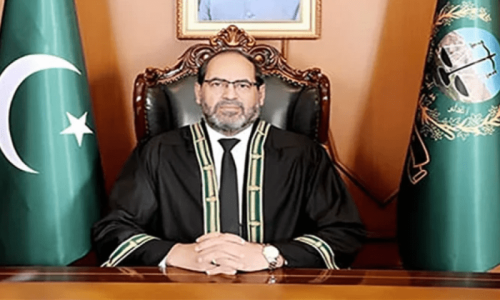AL QUDS, Sept 3: Israeli Defence Minister Ehud Barak said in an interview broadcast on Wednesday there was still time for diplomacy to curb Iran's nuclear programme but that Israel was serious about using “any option” if that failed.
“The time is still for diplomacy and sanctions, but much more effective sanctions,” Barak said in an interview with Al Jazeera television.
“We keep saying that we do not remove any option from the table. I propose to others not to remove any option from the table as well. But when we say it, we mean it,” he added.
Israel, which is thought to have the Middle East's only atomic arsenal, believes Iran could have a nuclear bomb by 2010 and says an Iranian nuclear weapon would threaten the existence of the Jewish state.
Iran denies seeking nuclear weapons and says it is enriching uranium only for use in generating electricity.
Deputy Prime Minister Shaul Mofaz, a candidate in the race to replace Ehud Olmert as prime minister, stoked tensions in June by saying that war with Iran could be “unavoidable”.
Referring to peace talks with Palestinians, Barak said some Arab neighbourhoods in Al Quds could become the capital of a future Palestinian state as part of a final peace agreement.
He did not say whether these neighbourhoods would include all of Arab East Jerusalem, which Israel captured in the 1967 Middle East war and annexed in a move not recognised internationally.
Palestinians want East Jerusalem as the capital of the state they hope to establish in the West Bank and Gaza Strip.
“We can find a formula under which certain neighbourhoods, heavily-populated Arab neighbourhoods, could become, in a peace agreement, part of the Palestinian capital that, of course, will include also the neighbouring villages around Jerusalem,” Barak said.
US-sponsored peace talks were launched last November by Israeli Prime Minister Ehud Olmert and Palestinian President Mahmoud Abbas with the goal of reaching an agreement in 2008.
But the negotiations have been marred by violence, as well as disputes over Jewish settlement building and Olmert’s insistence that the fate of Al Quds be decided later.
“I’m not sure whether the gaps are close enough,” Barak said when asked if a deal was possible this year.
The talks have been thrown into further doubt by Olmert’s announcement that he would step down as prime minister once his centrist Kadima party elects a new leader later this month.
Israel considers all of Al Quds, including some surrounding areas in the occupied West Bank, to be its capital.—Reuters















































Dear visitor, the comments section is undergoing an overhaul and will return soon.